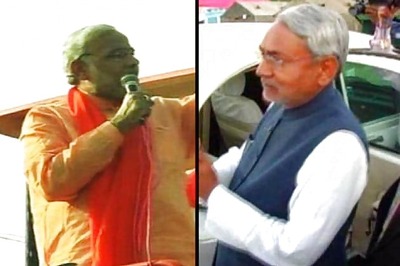
views
Srinagar: The central government’s August 5 decision to end Jammu and Kashmir’s special status and reorganise the state into two union territories seemingly came as a shock for employees of the J&K power department who are contemplating an indefinite strike.
The restructuring of J&K government wings has not gone down well with employees of the power development department, or JKPDD, which is being reconstituted into four state public sector undertakings (PSUs).
Nearly 300 JKPDD employees last week held a demonstration following a state government order which declared nomination of boards of directors for the newly created PSUs.
The development came days after union minister of state for power RK Singh told the media that multiple central agencies dealing directly with the generation and transmission process will ensure that electricity supply in J&K for the upcoming winter period will be “far better than the previous year”.
On September 16, the state administration, in compliance with the Jammu and Kashmir Reorganisation Act, 2019, issued an order to reconstitute the JKPDD into PSUs.
The employees see the move to split the department as the first step to privatise electricity supply in J&K. The new PSUs will have separate mandates to look over power sourcing and distribution in Jammu, Kashmir and Ladakh divisions. The protesters have threatened to go on an indefinite strike if government continues with its plan to “divide the PDD” into PSU's.
They fear that not only will the move allow the private sector to intervene in the department’s functioning, thus putting their jobs at stake, reconstituting the unit will allow private players to have a say on electricity price slabs. The power department employees number about 31,000 in Jammu and Kashmir.
According to senior government officials, the proposal to convert the JKPDD into PSUs was first floated a decade ago following which an Australia-based private consultancy was hired to assess the department and provide a roadmap. However, recommendations of the company were never adopted by the state government.
The Order
The administration order, a copy of which is with News18.com, says JKPDD has now been reconstituted into J&K State Power Transmission Company Limited, J&K State Power Trading Company Limited, Jammu Power Distribution Company Limited and Kashmir Power Distribution Company.
Among the directors are Arun Kumar, commissioner in finance department, Rohit Kansal, principal secretary in planning, development and monitoring department, Shaleen Kabra, principal secretary in home department, and Hirdesh Kumar, commissioner/secretary in JKPDD.
What the order essentially indicated is that the power department will now be operating as independent companies reporting to the state administration instead of a single government wing.
A PSU by the name J&K State Power Development Corporation Limited (JKSPDCL) which acts as a semi-autonomous body responsible for power generation, will also be restructured. A new Ladakh Power Development Company Limited will be formed out of JKSPDCL.
Till now the JKPDD, which is the main electricity distribution and maintenance body in J&K, had seven wings that overlooked different areas which included planning, design, inspection, maintenance, electrification, etc.
Employees Anxious
The employees have constituted the J&K Power Employees Coordination Committee which is an amalgamation of eight JKPDD employee unions. Zulkarnain Bhat, the spokesperson of the committee, accused the department of not keeping employees in the loop on the decisions taken by the administration.
“The exercise is being done under the pretext of unbundling which basically means reorganisation. Our argument is that the department is already unbundled. The work is divided among different wings. Furthermore, it is not that making corporations out of JKPDD is a new initiative. Already there is a corporation which has been discharging its responsibilities and duties. Where does the need arise to divide the PDD is beyond us,” said Bhat.
Sanjay Dhar, president of the union of J&K non-gazetted electrical employees, said that instead of dividing the power department into PSUs, the government should first look into the mismanagement that has caused a shortfall in production of electricity.
“The state was supposed to produce around 1,900 megawatt of electricity and instead it produces 1,002.This shortfall and losses incurred by the state should be looked into and measures found to fix it instead of handing over the department to private players. The private companies will hire people on lower salaries. What happens to the 31,000 employees who depend on the department?” he said.
Other employees expressed fears that major stakes of the PSUs will be handed over to corporate houses.
“Just like in other states where entry of private power companies was made possible by government interventions, in J&K too the same thing is happening. The power price will shoot up,” said Mohammad Iqbal, an engineer in the JKPDD.
Government Line
A senior power department official, who requested anonymity, said that the exercise was being carried out as per Article 85 of the J&K Reorgansation Act. It specifies that the Centre may establish an advisory committee for apportionment of assets, rights and liabilities of companies and corporations between the UT of J&K and UT of Ladakh and for the purpose of issues relating to the continuance of arrangements in regard to generation and supply of electric power and supply of water.
When asked if the fears about privatising electricity are genuine, the official said, “It is not privatisation. It is corporatisation. This model has been adopted by 26 states in India.”
The employees though claim that none of the states that adopted the model had success. “Instead, private companies were roped in after the PSUs failed,” said Shaeel Ahmed, a junior engineer in JKPDD.
Another senior government official said that the power department had offered resistance to the division for the last seven years, but now with the reorganisation bill, there isn't much it can do.
“I am part of the management but I too am going to be affected,” he said. “This can’t be stopped.”




















Comments
0 comment